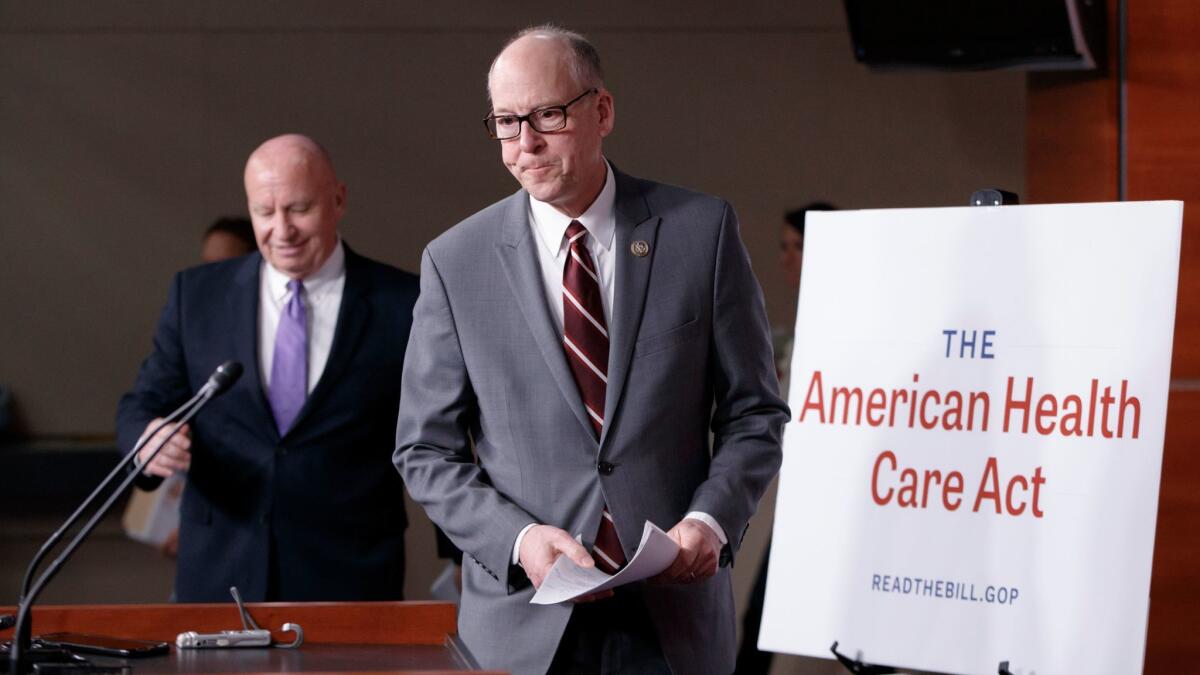Editorial: The GOP isn’t replacing all of Obamacare — just the parts that work

The House GOP leadership’s proposal for repealing and replacing Obamacare would actually leave much of the 2010 Affordable Care Act intact — except for the parts that make it work.
Instead of fixing the problems Republicans have been complaining about, it would make them worse. And rather than making insurance affordable to more people, it would raise costs for lower-income Americans and cut them for everyone else.
The bills’ authors don’t seem to be trying to improve the healthcare system; they just seem to be trapped by a promise they made to voters without regard to the damage it might do. In short, it’s a baffling plan with no clear objective that’s deservedly getting blasted from all sides, with conservatives, liberals and libertarians all trashing it.
The Affordable Care Act has dramatically slashed the number of uninsured Americans, and in some states (such as California), its reforms have given those not covered by large employer plans a much more consumer-friendly way to buy policies. Other states have implemented the act poorly, however, as opposition from state lawmakers and a hands-off approach toward insurers have led to large premium increases and fewer choices for coverage. In a few regions, in fact, large losses threaten to drive insurers out of the individual market completely.
Rather than fixing those problems by following the successful states’ lead, the House bills would strike off in a new direction. Insurers would be allowed to sell policies that cover a smaller percentage of the average customer’s medical costs. They also could charge older customers even more than the ACA allowed, and younger ones less. Insurers would almost certainly respond by churning out more low-premium, high-out-of-pocket-cost plans that are designed to appeal to people who don’t really need health insurance. Meanwhile, those who do need care — for example, parents with asthmatic children or diabetics — would be saddled with ever-more expensive plans.
But it gets worse. The House leaders’ plan would drop the ACA’s individual mandate, which required adult Americans to carry insurance or pay an increasingly hefty tax penalty. Instead, it would allow insurers to raise premiums 30% for one year for anyone who’d gone without coverage. That’s a considerably smaller penalty, increasing the incentive for young and healthy people to skip insurance until they really need treatment, especially if they’re not covered through their employer. As a consequence, insurers will be left covering a sicker, more expensive pool of customers not covered by large group plans, driving premiums up and increasingly out of reach for those with modest incomes. There are roughly 20 million people in that market today.
The most baffling aspect of the plan is the tax credits for low- and moderate-income households. Unlike the ACA’s subsidies, which are tied to the cost of a policy covering 70% of one’s healthcare costs, the new credits would be tied to a person’s age and would be too small to pay for anything but a bare-bones plan in many parts of the country. One new analysis estimates that once the bill went into effect in 2020, costs would go up for the average customer by more than $2,400 per year — and by more than $4,000 for low-income Americans.
Of course, the tax credit can only be so generous, given that the bills would repeal almost all of the tax increases that helped pay for Obamacare. The result would be a $310-billion windfall over 10 years for the wealthiest American taxpayers — and unaffordably high healthcare costs for millions of other, less fortunate citizens. If the Republicans’ goal is to drive more people off insurance and into hospital emergency rooms, these bills are just the ticket.
Follow the Opinion section on Twitter @latimesopinionand Facebook
ALSO
Obamacare repeal: A bad goal that’s proving hard to achieve
The hidden costs of replacing Obamacare
More to Read
A cure for the common opinion
Get thought-provoking perspectives with our weekly newsletter.
You may occasionally receive promotional content from the Los Angeles Times.










